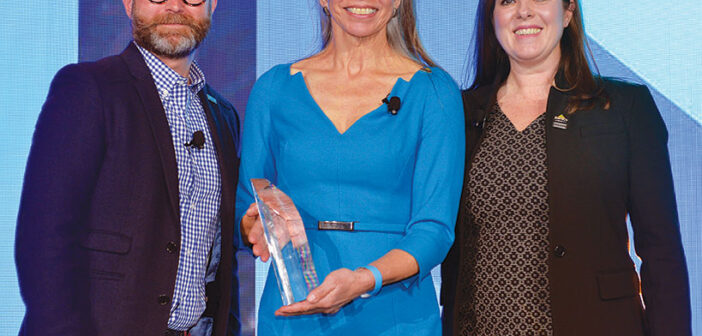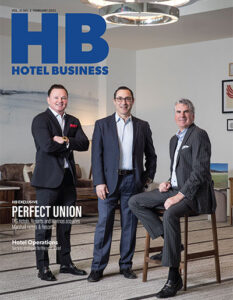The hospitality industry came together for the Americas Lodging Investment Summit (ALIS) at the JW Marriott Los Angeles at L.A. LIVE, and once again, how the industry will look in 2022 was top of mind for the attendees and presenters.

“Boardroom Outlook: Assets–Positioning for Growth” brought together (left to right) moderator Kevin Mallory, global head/senior managing director, CBRE, and panelists Geoff Ballotti, president/CEO, Wyndham Hotels & Resorts; Michael Deitemeyer, president/CEO, Aimbridge Hospitality; Stephanie Linnartz, president, Marriott International; and Patrick Pacious, president/CEO, Choice Hotels.
The first-day session, “Boardroom Outlook: Assets–Positioning for Growth,” moderated by Kevin Mallory, global head/senior managing director, CBRE, included panelists Geoff Ballotti, president/CEO, Wyndham Hotels & Resorts; Michael Deitemeyer, president/CEO, Aimbridge Hospitality; Stephanie Linnartz, president, Marriott International; and Patrick Pacious, president/CEO, Choice Hotels. They all agreed that leisure travel will be a big part of the growth story this year—much as it has fueled the recovery so far. “Leisure travel is what…will continue to fuel the growth for Wyndham going forward and for all of our companies,” said Ballotti. “It is remarkable…that December’s average daily rate was the highest this industry has ever seen.”
Pacious said there have been a number of trends that have been accelerated during the pandemic that have pushed growth in leisure travel. “The first is the retirement of baby boomers and others…,” he said. “There are a lot of people whose side hustle has taken off where their market portfolio is doing well, and they are making decisions to leave the workforce. What are those people going to do? They have time to travel.”
He also said he expects to see more road trips going forward—a significant trend that was growing even before the pandemic.

The “Boardroom Outlook: Operations—Increasing Profitability Without Sacrificing Quality” panel was moderated by Chip Rogers, president/CEO, American Hotel and Lodging Association (AHLA), and included panelists (left to right) Larry Cuculic, president/CEO, BWH Hotel Group; Sloan Dean, CEO/president, Remington Hotels; and Jeff Wagoner, president/CEO, Outrigger Hotels & Resorts.
Marriott’s Linnartz said that the company saw a return to 2019 room night numbers for leisure last year, but group and business travel is still lagging. “Groups and meetings has surprised us quite a bit,” she said. “Many of us thought that the individual business traveler would come back before groups and meetings, but surprisingly, meetings have come back more quickly.”
She reported that the company’s booking pace for this year and for 2023 and 2024 is quite strong. “Talking to our customers, people have realized that as great as all these tools like Teams and Zoom and hybrid meetings are, nothing replaces face-to-face,” she said. “We are quite bullish on the outlook for group for the next several years, and I do think the business traveler will come back.”
Deitemeyer said that his company feels very good about the upcoming year. “We are bullish that things will come back in the fall,” he said.
During the second-day session, “Boardroom Outlook: Operations—Increasing Profitability Without Sacrificing Quality,” moderator Chip Rogers, president/CEO, American Hotel and Lodging Association (AHLA), discussed the issues that hoteliers will face in the new year with panelists Larry Cuculic, president/CEO, BWH Hotel Group; Sloan Dean, CEO/president, Remington Hotels; and Jeff Wagoner, president/CEO, Outrigger Hotels & Resorts.
Rogers began the session by asking the audience, as well as the panelists, what they felt the biggest issue facing the industry will be for the near future. Not surprisingly, both the audience and company leaders agreed that the workforce challenge is number one.
Cuculic said that since he took over the leadership of his company on Dec. 1, 2021, he has taken a listening tour of properties across the country. “Overwhelmingly, the answer to that question is labor,” he said. “When I ask our members how many of them have made beds in their hotels in the last year and a half, they all raise their hands.”
Dean said raising wages can help, but it is important to make sure that potential new workers know that hospitality is more than just a job. “It is a good choice for a career path,” he said. “It is one of the few industries where you can only have a high school diploma and go on to become the CEO.”
Cuculic believes that those employees who have left hospitality for other industries will return. “People who have caring for others in their DNA will return to hospitality because that is what they enjoy doing,” he said. “Eventually, working at Amazon, scanning barcodes and pushing boxes down the line—I think that is a short-term decision that they will get tired of.”
Wagoner said that his company, which is based in Hawaii, does not have as big a problem with labor as the others. But, he added, he has to deal with inflation. “[It] truly is something that we’re all going to be wrestling with for some time,” he said. “I think there are plenty of examples of inflation and how it is going to affect us, and I don’t think it is going to go away.”


